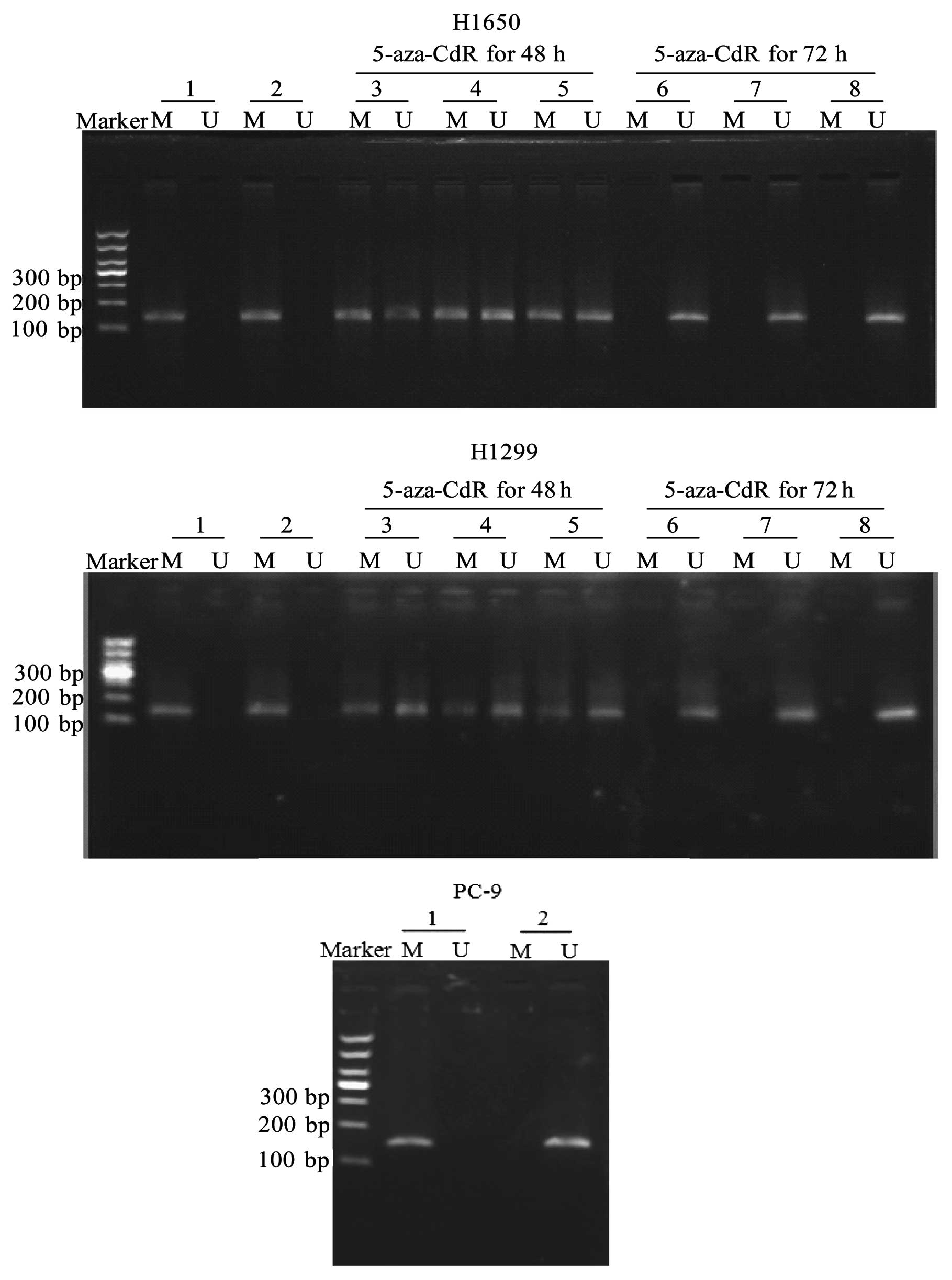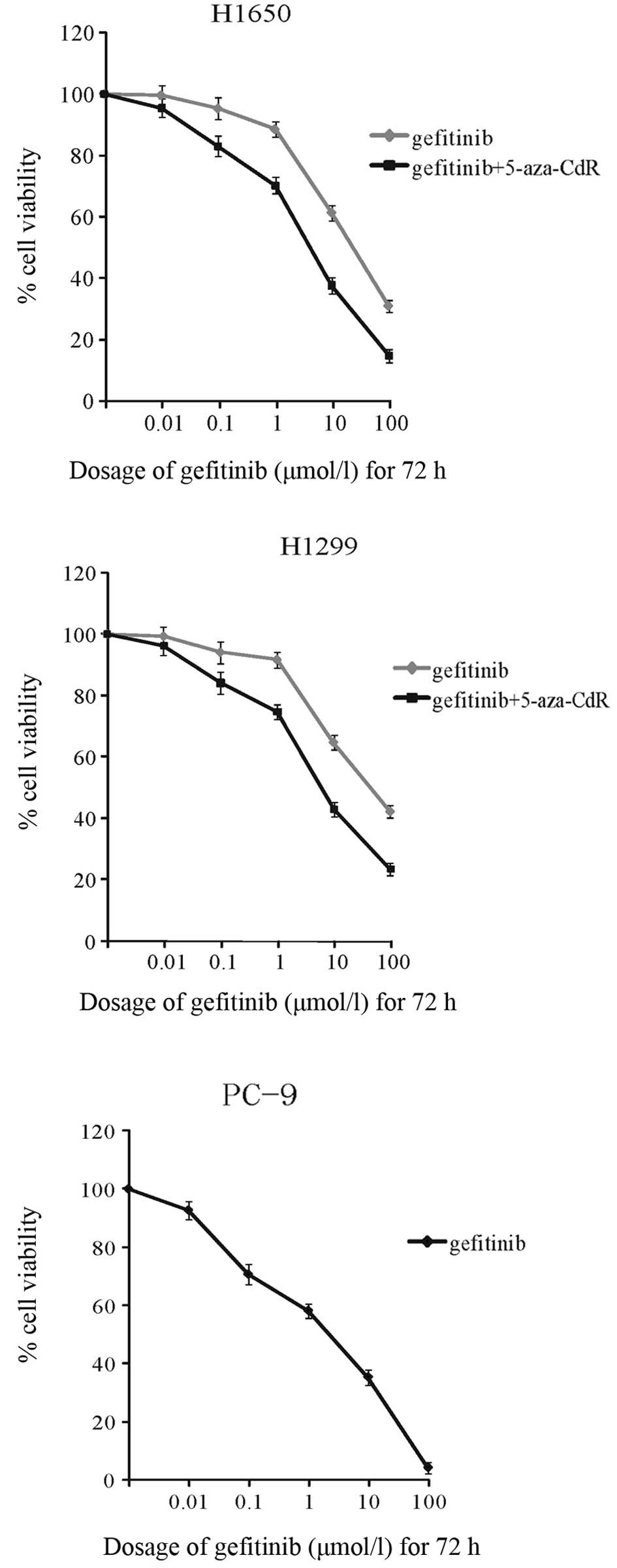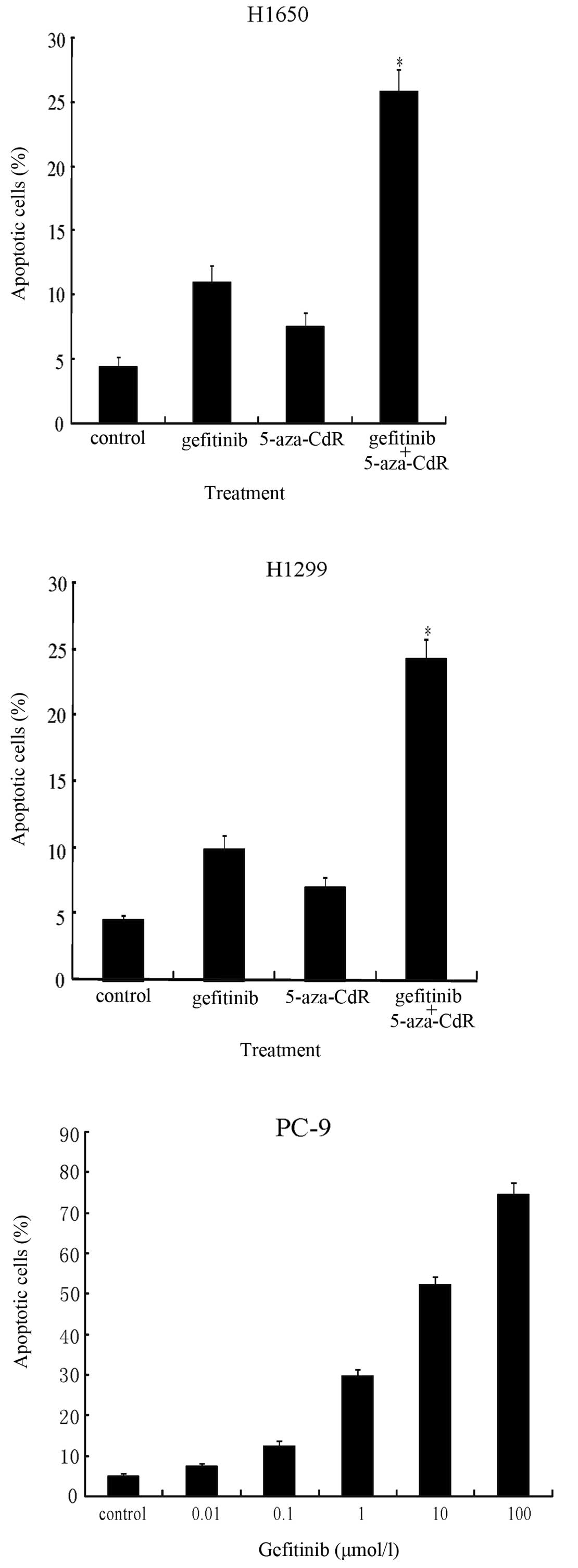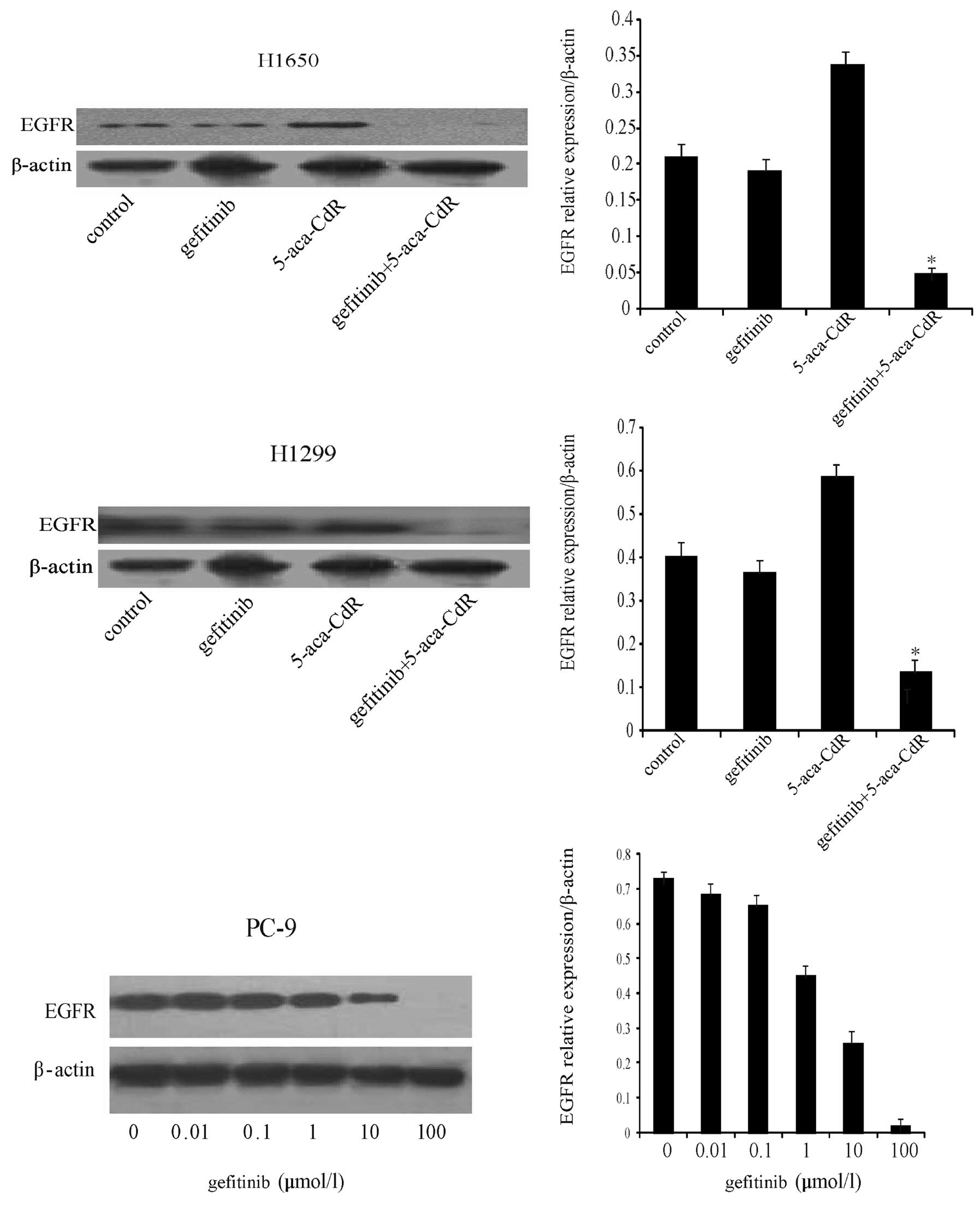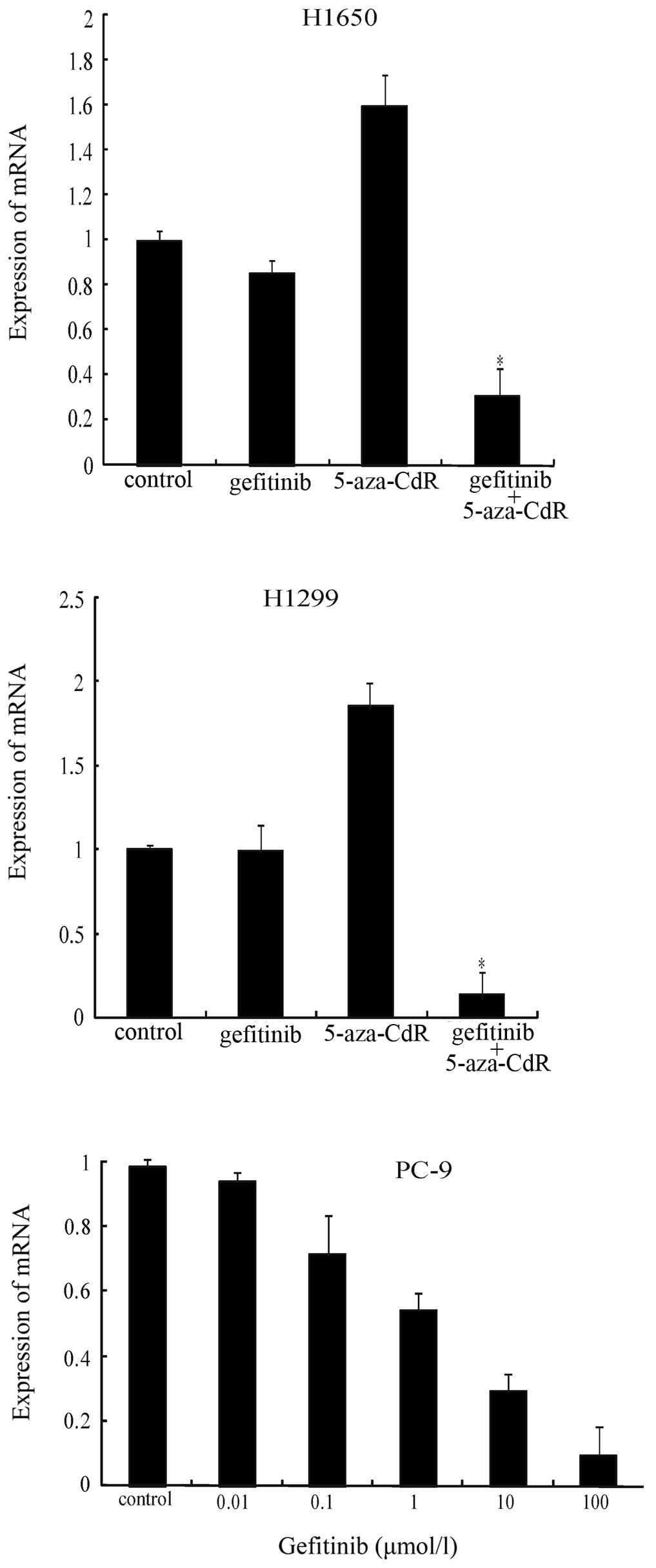|
1
|
Ahmed SM and Salgia R: Epidermal growth
factor receptor mutations and susceptibility to targeted therapy in
lung cancer. Respirology. 11:687–692. 2006. View Article : Google Scholar : PubMed/NCBI
|
|
2
|
Hynes NE and Lane HA: ERBB Receptors and
cancer: The complexity of targeted inhibitors. Nat Rev Cancer.
5:341–354. 2005. View
Article : Google Scholar : PubMed/NCBI
|
|
3
|
Yarden Y and Sliwkowski MX: Untangling the
ErbB signaling network. Nat Rev Mol Cell Biol. 2:127–137. 2001.
View Article : Google Scholar : PubMed/NCBI
|
|
4
|
Citri A, Skaria KB and Yarden Y: The deaf
and the dumb: The biology of ErbB-2 and ErbB-3. Exp Cell Res.
284:54–65. 2003. View Article : Google Scholar : PubMed/NCBI
|
|
5
|
Baselga J: Why the epidermal growth factor
receptor? The rationale for cancer therapy. Oncologist. 7:2–8.
2002. View Article : Google Scholar : PubMed/NCBI
|
|
6
|
Cappuzzo F, Finocchiaro G, Metro G,
Bartolini S, Magrini E, Cancellieri A, Trisolini R, Castaldini L,
Tallini G and Crino L: Clinical experience with gefitinib: An
update. Crit Rev Oncol Hematol. 24:31–45. 2006. View Article : Google Scholar
|
|
7
|
Haber DA, Bell DW, Sordella R, et al:
Molecular targeted therapy of lung cancer: EGFR mutations and
response to EGFR inhibitors. Cold Spring Harb Symp Quant Biol.
70:419–426. 2005. View Article : Google Scholar : PubMed/NCBI
|
|
8
|
Janne PA and Johnson BE: Effect of
epidermal growth factor receptor tyrosine kinase domain mutations
on the outcome of patients with non-small cell lung cancer treated
with epidermal growth factor receptor tyrosine kinase inhibitors.
Clin Cancer Res. 12:4416–4420. 2006. View Article : Google Scholar
|
|
9
|
Esteller M: Cancer epigenomics: DNA
methylation and histone-modification maps. Nat Rev Gene. 8:286–298.
2007. View
Article : Google Scholar : PubMed/NCBI
|
|
10
|
Sharma S, Kelly TK and Jones PA:
Epigenetics in Cancer. Carcinogenesis. 31:27–36. 2010. View Article : Google Scholar
|
|
11
|
Silva M, Azenha D, Pereira C, et al:
Gastric carcionoma and chronic gastritis: epigenetic regulation of
CDH1 (E-cadherin), CDKN2A (p16INK4A), PTGS2 (COX-2) and EGFR genes
through methylation. Acta Med Port. 23:5–14. 2010.(In
Portuguese).
|
|
12
|
Wang Z, Xu J, Geng X and Zhang W: Analysis
of DNA methylation status of the promoter of human telomerase
reverse transciptase in gastric carcinogenesis. Arch Med Res.
41:1–6. 2010. View Article : Google Scholar : PubMed/NCBI
|
|
13
|
Taron M, Rosell R, Felip E, et al: BRCA1
mRNA expression levels as an indicator of chemoresistance in lung
cancer. Hum Mol Genet. 13:2443–2449. 2004. View Article : Google Scholar : PubMed/NCBI
|
|
14
|
Grivaux M, Zureik M, Marsal L, et al:
Five-year survival for lung cancer patients managed in general
hospitals. Rev Mal Respir. 28:e31–e38. 2011.PubMed/NCBI
|
|
15
|
Gadgeel SM, Ali S, Philip PA, Wozniak A
and Sarkar FH: Genistein enhances the effect of epidermal growth
factor receptor tyrosine kinase inhibitors and inhibits nuclear
factor kappa B in non-small cell lung cancer cell lines. Cancer.
115:2165–2176. 2009. View Article : Google Scholar : PubMed/NCBI
|
|
16
|
Vucic EA, Brown CJ and Lam WL: Epigenetics
of cancer progression. Pharmacogenomics. 9:215–234. 2008.
View Article : Google Scholar
|
|
17
|
Duffy MJ, Napieralski R, Martens JW, et
al: Methylated genes as new cancer biomarkers. Eur J Cancer.
45:335–346. 2009. View Article : Google Scholar : PubMed/NCBI
|
|
18
|
Kim YT, Park SJ, Lee SH, et al: Prognostic
implication of aberrant promoter hypermethylation of CpG islands in
adenocarcinoma of the lung. J Thorac Cardiovasc Surg.
130:13782005.PubMed/NCBI
|
|
19
|
Safar AM, Spencer H III, Su X, et al:
Methylation profiling of archived non-small cell lung cancer: a
promising prognostic system. Clin Cancer Res. 11:4400–4405. 2005.
View Article : Google Scholar : PubMed/NCBI
|
|
20
|
Plimack ER, Stewart DJ and Issa JP:
Combining epigenetic and cytotoxic therapy in the treatment of
solid tumors. J Clin Oncol. 25:4519–4521. 2007. View Article : Google Scholar : PubMed/NCBI
|
|
21
|
Daskalakis M, Blaqitko-Dorfs N and
Hackanson B: Decitabine. Recent Results Cancer Res. 184:131–157.
2010. View Article : Google Scholar
|
|
22
|
Chai G, Li L, Zhou W, et al: HDAC
inhibitors act with 5-aza-2′-deoxycytidine to inhibit cell
proliferation by suppressing removal of incorporated abases in lung
cancer cells. PLoS One. 3:e24452008.
|
|
23
|
Montero AJ, Díaz-Montero CM, Mao L, et al:
Epigenetic inactivation of EGFR by CpG island hypermethylation in
cancer. Cancer Biol Ther. 5:1494–1501. 2006. View Article : Google Scholar : PubMed/NCBI
|
|
24
|
Majumdar AP, Kodali U and Jaszewski R:
Chemopreventive role of folic acid in colorectal cancer. Front
Biosci. 9:2725–2732. 2004. View
Article : Google Scholar : PubMed/NCBI
|
|
25
|
Nagothu KK, Rishi AK, Jaszewski R, Kucuk O
and Majumdar AP: Folic acid-mediated inhibition of serum-induced
activation of EGFR promoter in colon cancer cells. Am J Physiol
Gastrointest Liver Physiol. 287:G541–G546. 2004. View Article : Google Scholar : PubMed/NCBI
|
|
26
|
Momparler RL and Ayoub J: Potential of
5-aza-2′-deoxycytidine (Decitabine) a potent inhibitor of DNA
methylation for therapy of advanced non-small cell lung cancer.
Lung Cancer. 34(Suppl 4): S111–S115. 2001.
|
|
27
|
Lynch TJ, Bell DW, Sordella R, et al:
Activating mutations in the epidermal growth factor receptor
underlying responsiveness of non-small-cell lung cancer to
gefitinib. N Engl J Med. 350:2129–2139. 2004. View Article : Google Scholar : PubMed/NCBI
|
|
28
|
Paez JG, Jänne PA, Lee JC, et al: EGFR
mutations in lung cancer: correlation with clinical response to
gefitinib therapy. Science. 304:1497–1500. 2004. View Article : Google Scholar : PubMed/NCBI
|
|
29
|
Sharma SV, Bell DW, Settleman J and Haber
DA: Epidermal growth factor receptor mutations in lung cancer. Nat
Rev Cancer. 7:169–181. 2007. View
Article : Google Scholar : PubMed/NCBI
|
|
30
|
Tsao M-S, Sakurada A, Cutz J-C, et al:
Erlotinib in lung cancer - molecular and clinical predictors of
outcome. N Engl J Med. 353:133–144. 2005. View Article : Google Scholar : PubMed/NCBI
|
|
31
|
Yun CH, Menqwasser KE, Toms AV, et al: The
T790M mutation in EGFR kinase causes drug resistance by increasing
the affinity for ATP. Proc Natl Acad Sci USA. 105:2070–2075. 2008.
View Article : Google Scholar : PubMed/NCBI
|
|
32
|
Pao W, Miller VA, Politi KA, et al:
Acquired resistance of lung adenocarcinomas to gefitinib or
erlotinib is associated with a second mutation in the EGFR kinase
domain. PLoS Med. 2:e732005. View Article : Google Scholar : PubMed/NCBI
|
|
33
|
Kosaka T, Yatabe Y, Endoh H, et al:
Analysis of epidermal growth factor receptor gene mutation in
patients with non-small cell lung cancer and acquired resistance to
gefitinib. Clin Cancer Res. 12:5764–5769. 2006. View Article : Google Scholar : PubMed/NCBI
|
|
34
|
Engelman JA, Zejnullahu K, Mitsudomi T, et
al: MET amplification leads to gefitinib resistance in lung cancer
by activating ERBB3 signaling. Science. 316:1039–1043. 2007.
View Article : Google Scholar : PubMed/NCBI
|
|
35
|
Guo A, Villen J, Kornhauser J, et al:
Signaling networks assembled by oncogenic EGFR and c-met. Proc Natl
Acad Sci USA. 105:692–697. 2008. View Article : Google Scholar : PubMed/NCBI
|
|
36
|
Watanabe K, Emoto N, Hamano E, et al:
Genome structure-based screening identified epigenetically silenced
microRNA associated with invasiveness in non-small-cell lung
cancer. Int J Cancer. 130:2580–2590. 2012. View Article : Google Scholar
|















